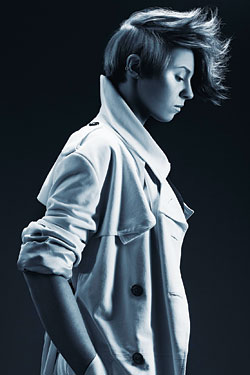
“H onestly, mate, you wouldn’t believe the fucking questions I’ve been asked,” says British singer Elly Jackson of the tabloid attention she’s been getting back home. “Are you gay? Have you ever had sex with a girl? Are you in a relationship? Who’s your boyfriend? Who are your ex-boyfriends?”
A small, pale redhead with a gravity-defying quiff—a style the 21-year-old describes as “androgynous moody bitch”—and a distinct case of the potty mouth seemingly required of all British pop stars, Jackson is one half of the synth-pop duo La Roux. A year ago, no one had heard of them, but after their singles “Bullet Proof” and “In for the Kill” punched a big hole in the British charts, La Roux was exciting not only national reporters with Jackson’s aggressively ambiguous sexuality, but also American stars like Kanye West, who declared himself a fan. Just the other week, R&B singer Kelis beat a path to the dingy South London flat where Jackson and her keyboardist, Ben Langmaid, recorded their self-titled debut. “Kelis’s recording a track in Ben’s living room!” Jackson exclaims, laughing. “I can’t get over it!”
With their bubbling synth riffs and deliberately acrylic production, La Roux pays conscious homage to Depeche Mode and the Human League, but to call them an eighties throwback doesn’t do justice to the rough-hewn, faux naïveté of their album, with Jackson powering through passionate, even tempestuous, lyrics about unrequited love and longing with the abandon of someone who doesn’t know she’s being listened to. “That’s more or less how we made it,” she says. “As far as we were concerned, nobody was listening. Maybe if I’d known how well the album was going to do, I wouldn’t have been so honest. What you are hearing is incredibly, incredibly, incredibly personal. That’s why I like working with Ben—when I sing in front of him, I don’t feel like I’m singing in front of anyone else.”
The two met through a friend who had heard Jackson sing at a New Year’s party. At the time, she was heavily into folk and blues, and it was the eight-years-older Langmaid who introduced her to bands like Blancmange and Japan. Jackson remembers the first time she heard Depeche Mode’s 1981 hit “New Life” on her car stereo. “I nearly crashed! It was like the way people must have been back when they first heard it in the eighties,” she says. “Folk music always made me feel sad, in a good way—beautifully sorrowful and fragile. But this made me so happy. I literally wanted to jump up and down.”
Jackson co-writes La Roux’s songs with the more reclusive Langmaid (“He doesn’t want to be a pop star”), who prefers to stay home and lay down bleepy, bouncy, fast-tempo synth tracks to support Jackson’s belter of a voice. One song, “Cover My Eyes,” about the perennial pain of seeing someone you love in the arms of another, ends with her voice beginning to crack. “I lusted after a relationship with this person, but I never got it. There are vocal tracks with me crying all over the place,” Jackson says, adding, “I’m still really close to that person. We get on really well.” Whatever the outcome, the blues were never this zesty. “Ben was like, fuckin’ hell, I really love this contrast: raw emotion and unbelievably happy melodies.”
La Roux
Webster Hall.
February 11.
6:30 p.m.